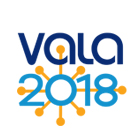
Humanoid robotics and digital literacy in Australian libraries
VALA2018 CONCURRENT SESSION 8
Wednesday 14 February 2018, 12:00 – 12:30
Sam Kingsley
The Brainary
Please tag your comments, tweets, and blog posts about this session: #vala2018 #s21
Abstract
The advent and commercialization of humanoid robotics has enabled Australian Libraries to access and utilise this technology to help develop digital literacy skills within their communities and to engage their communities in unique and innovative ways. Sam Kingsley from The Brainary and his robotic companion NAO will investigate the implementation of humanoid robotic technologies in Australian Libraries. The focus will be on the challenges, benefits and unexpected outcomes that this technology produces through the lens of Australian and International case studies.

This work is licensed under a Creative Commons Attribution-NonCommercial License.




